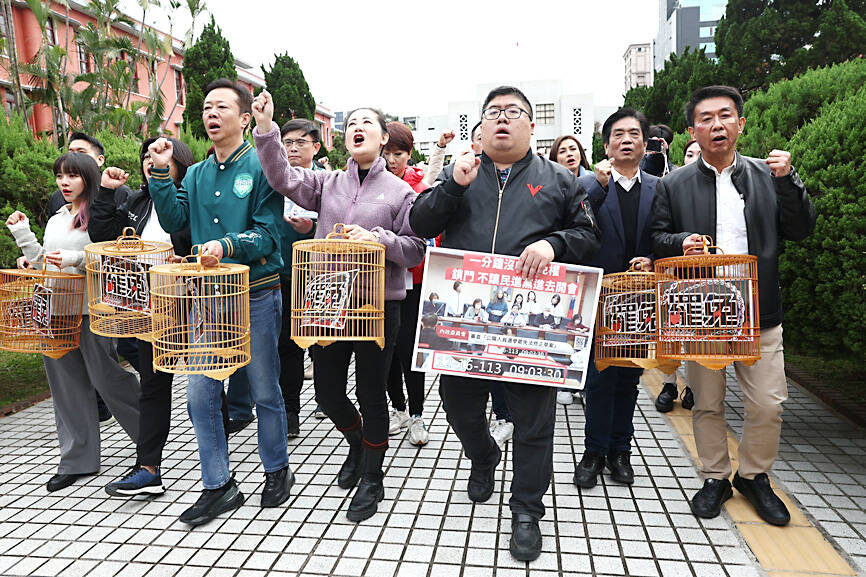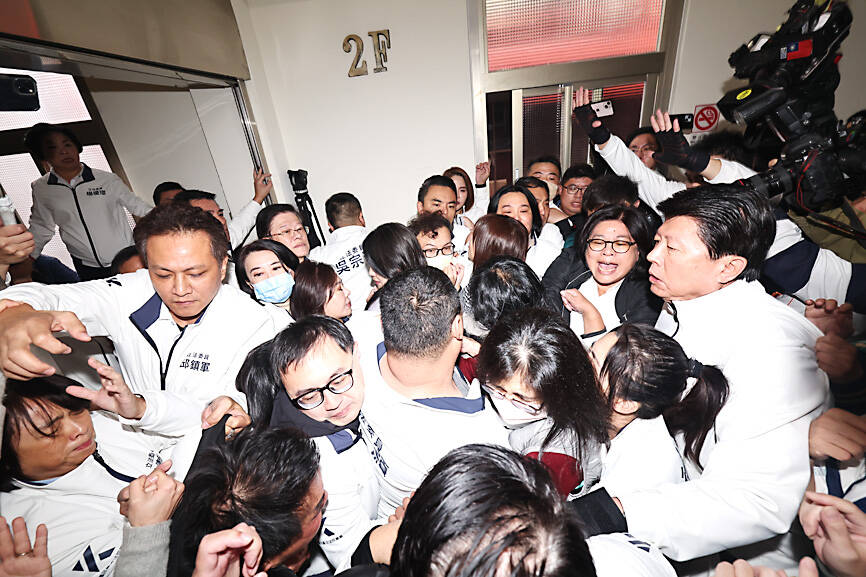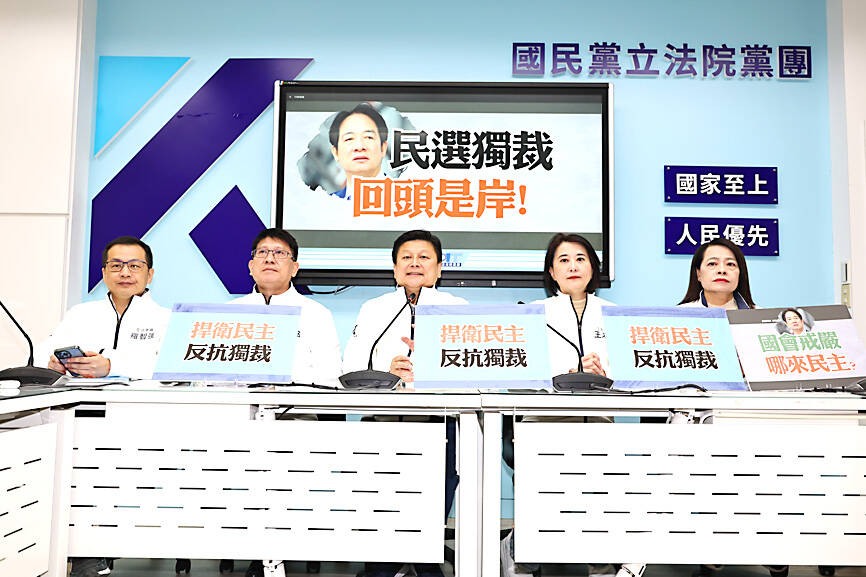Scuffles broke out at the legislature yesterday between Chinese Nationalist Party (KMT) and Democratic Progressive Party (DPP) lawmakers ahead of an Internal Administration Committee meeting to review draft amendments to the Civil Servants Election and Recall Act (公職人員選舉罷免法).
At the beginning of the 9am meeting, KMT legislators occupied the podium and blocked DPP lawmakers from entering the room.
Committee convener Hsu Hsin-ying (徐欣瑩) of the KMT announced the unanimous passage of the preliminary review of the draft amendments at 9:02 am and concluded the meeting at 9:03 am.

Photo: CNA
In preparation for yesterday’s review session, several KMT lawmakers gathered outside the conference room late on Sunday, blocking one side of the hallway with chairs and sealing the door with tape, leaving a single entrance and exit. The KMT lawmakers also used their bodies to block the other side.
Scuffles broke out at 6am when DPP legislators realized they could not enter the room.
The approved amendments aim to raise the threshold for a recall, including one that requires the number of recall votes to exceed the votes an official originally received when elected.

Photo: CNA
Under the current law, a recall proposal is approved if the number of votes supporting the recall exceeds the number of votes opposing it. Additionally, the number of supporting votes must be at least one-quarter of the total number of votes cast in the election.
The DPP contended that the proposal would make it difficult for elected officials to be recalled.
DPP lawmakers assembled outside the legislative chamber at 9:40am for a news conference, carrying placards that accused the KMT of depriving citizens of the right to vote to remove unfit politicians.

Photo: CNA
They also wielded signs saying: “Martial law in the legislature, bullying against democracy.”
“KMT legislators took hostile actions to bar DPP members from attending the committee meeting by locking the door and physically blocked us from entering,” DPP caucus chief executive Rosalia Wu (吳思瑤) said.
“The KMT had set up an ‘iron gate’ to bar DPP members from the meeting,” committee co-covener DPP Legislator Chang Hong-lu (張宏陸) said. “If this continues, the KMT will play its own game and be further emboldened to expand legislative powers and take away the democratic rights of our citizens.”
Separately, DPP Secretary-General Lin Yu-chang (林右昌) said that as well as KMT caucus whip Fu Kun-chi (傅?萁), KMT Chairman Eric Chu (朱立倫) and Legislative Speaker Han Kuo-yu (韓國瑜) must take responsibility for “this new martial law tactic. They must apologize to all citizens and rectify the issue by referring the bill back to the committee for review.”
In response, Fu said that DPP lawmakers had paralyzed the legislature numerous times.
He said several DPP lawmakers showed up at the committee door on Sunday night, threatening to fight the bill by stopping yesterday’s meeting from taking place.
Fu said the KMT had to safeguard the podium in the committee room, to defend the rights of the public and ensure committee meetings can proceed smoothly.
Additional reporting by Bloomberg

CHAOS: Iranians took to the streets playing celebratory music after reports of Khamenei’s death on Saturday, while mourners also gathered in Tehran yesterday Iranian Supreme Leader Ayatollah Ali Khamenei was killed in a major attack on Iran launched by Israel and the US, throwing the future of the Islamic republic into doubt and raising the risk of regional instability. Iranian state television and the state-run IRNA news agency announced the 86-year-old’s death early yesterday. US President Donald Trump said it gave Iranians their “greatest chance” to “take back” their country. The announcements came after a joint US and Israeli aerial bombardment that targeted Iranian military and governmental sites. Trump said the “heavy and pinpoint bombing” would continue through the week or as long

TRUST: The KMT said it respected the US’ timing and considerations, and hoped it would continue to honor its commitments to helping Taiwan bolster its defenses and deterrence US President Donald Trump is delaying a multibillion-dollar arms sale to Taiwan to ensure his visit to Beijing is successful, a New York Times report said. The weapons sales package has stalled in the US Department of State, the report said, citing US officials it did not identify. The White House has told agencies not to push forward ahead of Trump’s meeting with Chinese President Xi Jinping (習近平), it said. The two last month held a phone call to discuss trade and geopolitical flashpoints ahead of the summit. Xi raised the Taiwan issue and urged the US to handle arms sales to

BIG SPENDERS: Foreign investors bought the most Taiwan equities since 2005, signaling confidence that an AI boom would continue to benefit chipmakers Taiwan Semiconductor Manufacturing Co’s (TSMC, 台積電) market capitalization swelled to US$2 trillion for the first time following a 4.25 percent rally in its American depositary receipts (ADR) overnight, putting the world’s biggest contract chipmaker sixth on the list of the world’s biggest companies by market capitalization, just behind Amazon.com Inc. The site CompaniesMarketcap.com ranked TSMC ahead of Saudi Aramco and Meta Platforms Inc. The Taiwanese company’s ADRs on Tuesday surged to US$385.75 on the New York Stock Exchange, as strong demand for artificial intelligence (AI) applications led to chip supply constraints and boost revenue growth to record-breaking levels. Each TSMC ADR represents

Pro-democracy media tycoon Jimmy Lai’s (黎智英) fraud conviction and prison sentence were yesterday overturned by a Hong Kong court, in a surprise legal decision that comes soon after Lai was jailed for 20 years on a separate national security charge. Judges Jeremy Poon (潘兆初), Anthea Pang (彭寶琴) and Derek Pang (彭偉昌) said in the judgement that they allowed the appeal from Lai, and another defendant in the case, to proceed, as a lower court judge had “erred.” “The Court of Appeal gave them leave to appeal against their conviction, allowed their appeals, quashed the convictions and set aside the sentences,” the judges